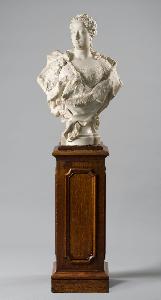Jan Baptist Xavery
Jan Baptist Xavery;Xavery
Place: Antwerp
Born: 1697
Death: 1742
Biography:
Jan Baptist Xavery, a Flemish sculptor from Antwerp, Belgium, was born in 1697 and died in 1742. He is regarded as the leading sculptor active in the Dutch Republic during the first half of the 18th century. Xavery's work encompasses a wide range of sculptures, including portrait busts, large-scale statues for residences and gardens, church furniture, wall decorations, tomb monuments, and small-scale statuettes in various materials.
Early Life and Training
Xavery was the son of sculptor Albert Xavery and Catharina Maria Herry (Herri). His father likely taught him before he entered the studio of Michiel van der Voort the Elder, a prominent sculptor in Antwerp. Xavery's younger brother, Gerardus Josephus, became a painter. In 1719, Xavery moved to Vienna and later to Italy, where he was influenced by the works of renowned artists.
Career and Notable Works
Xavery settled in The Hague, Netherlands, in 1721, where he became a prominent sculptor. He worked on various projects for William IV of Orange-Nassau, the Prince of Orange, including marble busts and large-scale statues for the prince's residence, Huis ten Bosch. Xavery also created sculptures for other notable patrons, such as Diederik Baron van Leyden, the regent of Leiden. His works can be found in various museums, including the Mauritshuis in The Hague. Some of his notable works include:
- Bust of Princess Anne of Hannover (1709-1759), a marble sculpture created in 1736, which can be found at the Mauritshuis in The Hague.
- Allegorical figures of Prudentia and Justitia, created for the Old City Hall of The Hague.
- Chimney pieces, such as the one representing Apollo and the Cumaean Sibyl, which was later removed by French occupiers and moved to the Trippenhuis in Amsterdam.
Legacy and Style
Xavery's style is characterized by his mastery of **Baroque** and **Rococo** elements, which are evident in his sculptures. His works often feature intricate details, flowing curves, and a sense of movement. Xavery's legacy can be seen in the many sculptors who followed in his footsteps, including his own sons, Frans and Jacob, who became painters. For more information on Jan Baptist Xavery and his works, visit Jan Baptist Xavery's page on Wikioo.org or the Wikipedia page dedicated to his life and work. The Museum Onze-Lieve-Vrouwekerk in Bruges, Belgium, and the Musées Royaux des Beaux-Arts in Brussels, Belgium, also feature some of Xavery's notable works.

